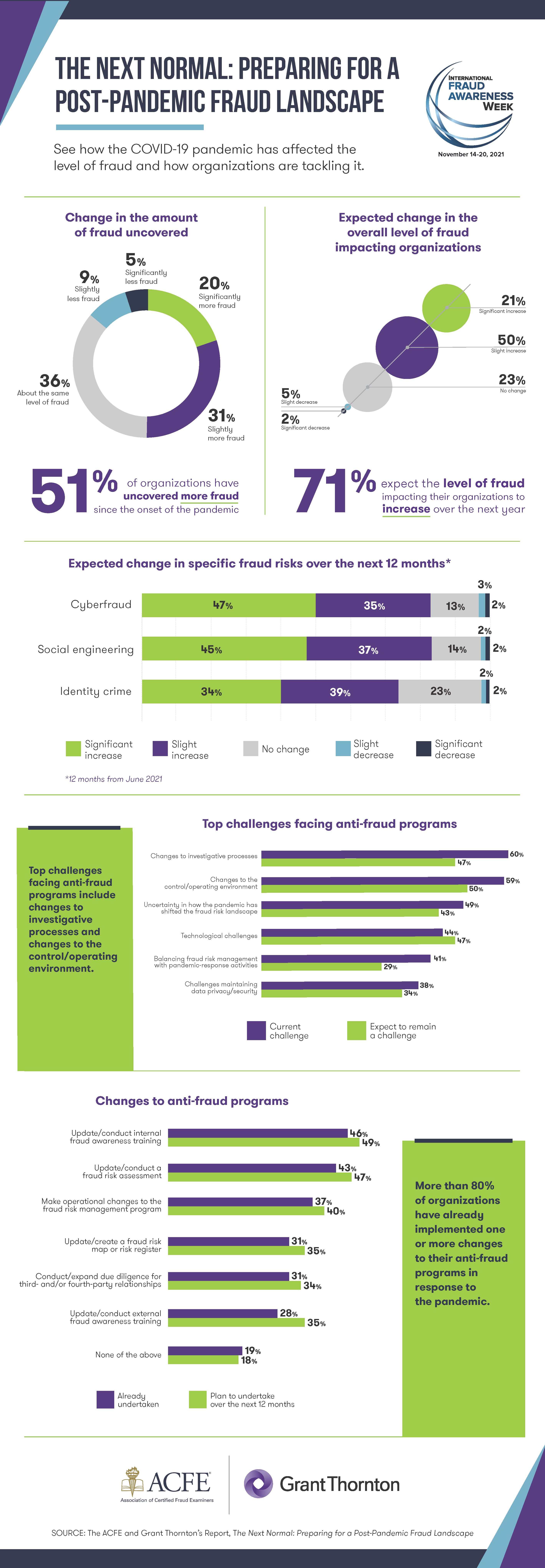Fraud trends and emerging risks in a post-pandemic work environment
Nov 10, 2021
With International Fraud Awareness Week kicking off on Nov. 14, now is a great time to look back at how the COVID-19 pandemic affected the level of fraud in the workplace and understand the roadblocks to preventing and detecting fraud in a post-pandemic work environment.
Fraud trends during the pandemic
To accommodate the effects of the pandemic, organizations had to make changes to their work environments, including:
- Allocation of resources: Organizations reevaluated budgets and allocated funding to cover “essential” activity because they had to be more aware of how they were spending money.
- Staffing: Staffing likely changed because of illness among the workforce, layoffs and furloughs, employees quitting, or departmental transfers to cover shortfalls.
- Operations: Organizations had to adjust to accommodate a remote work environment, as well as shift focus more on operational measures and less on fraud prevention measures.
Together, these changes provided ample incentives for people to exploit organizations' vulnerabilities and commit fraud.
Survey results from the Association of Certified Fraud Examiners (ACFE), which are summarized in the infographic below, found that 51 percent of organizations have uncovered more fraud since the pandemic started. Furthermore, 71 percent of respondents said that they expect the level of fraud in their organizations to increase over the next year.
Interestingly, while fraud has been on the rise, reports of fraud and losses of public resources to the State Auditor's Office have been at a historic low. So far in 2021, SAO has received 383 fraud reports. This is a 32 percent decrease from the 563 reports we received in 2019, which is more consistent with the number of reports we received prior to the pandemic.
But this doesn't mean that fraud isn't happening as much in Washington. Frauds are definitely occurring. With the transition to remote work environments, governments might be running into roadblocks to detecting and preventing fraud because of the physical restrictions placed on staff.
Roadblocks in preventing and detecting fraud during the pandemic
As the infographic explains, the same ACFE survey found that issues like changes to investigative processes and operating environments, as well as uncertainty about how the pandemic has changed the risk of fraud, are some of the top challenges organizations face as they fight fraud.
Given the changes and challenges, it's important to start thinking about the emerging risks that have come out of the pandemic. The infographic shows that specific fraud risks are expected to increase in the post-pandemic era, with the top risks being cyberfraud, social engineering and identity crime.
While these are some of the top emerging risks to consider, it doesn't mean that fraud isn't happening in other areas. As you assess your organization's emerging fraud risks, it's important to examine what you can do to identify them and how you can mitigate opportunities. A good starting point is to ask yourself these three questions:
- What processes and controls did we change to accommodate our organization during the pandemic?
- What fraud risks and opportunities exist now?
- What processes and controls can we establish to detect and prevent these fraud risks?
The bottom line is that it's important for your organization to revamp how you think about those preventative measures to fight fraud in your workplace.
International Fraud Awareness Week
SAO will be posting articles daily on the Audit Connection Blog to help your government learn about what you can do to prevent fraud. Our Special Investigations team has put together some great content, including articles about boards and executives' responsibilities for fighting fraud and emerging fraud risks for government-issued purchase cards, digital payment methods and Automated Clearing House (ACH) payments. And we'll even sharing a list of our favorite documentaries, podcasts and other media that can help you understand the human side of fraud.
Look out for these articles and be sure to check out the official website for #fraudweek to learn how your government can get involved.

